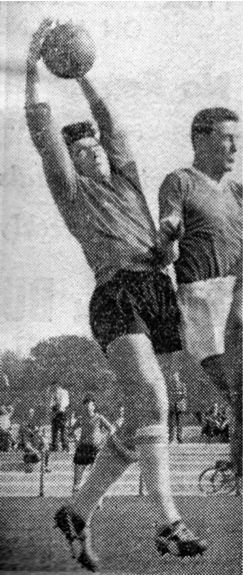There seem to be an ever-increasing number of awards handed out for all manner of things and St Albans City Football Club is no exception with its annual end of season awards. With that in mind we look back to an era when one of our local newspapers, the Herts Advertiser, ran an annual Sports Personality of the Year Award.
On 17thDecember 2017 our former goalkeeper Paul Bastock enhanced his Living Legend status when invited to be a part of the BBC’s Sports Personality of the Year programme. Bazza was invited to mix with star names from the world of sport in recognition of him breaking Peter Shilton’s world record of 1,249 senior competitive appearances, a figure that includes 315 games for the Saints.
Whilst Paul’s record is something rather special the achievements of the local award winners at the back end of the 1950s and through to the early 1970s were a touch more modest. The first award was presented in 1958 but the first time that a City player came close to winning it was in 1959 when Ron Wood was runner-up. It was won that year by Tipperary-born athlete Denis O’Gorman who, the following year, competed in the marathon at the Rome Olympics. Ron, a two-footed striker, scored 36 times in 66 games for the Saints but his high polling was a strange one in that he made only 31 appearances during 1959 and that included just one game during December – the month when voting took place. He retains a link to Clarence Park to this day in that he is the great uncle of Stand by Your Saints chairperson Lee Wood.
 The following year the Herts Advertiser award did come the way of the football club with Spanish goalkeeper Joe Fuentes (left) beating Sid Rabone, secretary of St Albans Cricket Club, into second place. Joe, born in Seville, had been in the country for just two years working as a nurse at Hill End and Cell Barnes Hospitals. His good form early in the 1960-61 season caught the eye of Luton Town and the Second Division club took him on a six-week trial. But moves to sign him at Kenilworth Road failed due to Joe not being resident in England for the required four years. A popular player off the pitch he struggled to regain his First team place upon his return to Clarence Park and became a regular in the Reserve team. Joe’s spell at the Park ended in March 1961 when he returned to Spain to undertake National Service.
The following year the Herts Advertiser award did come the way of the football club with Spanish goalkeeper Joe Fuentes (left) beating Sid Rabone, secretary of St Albans Cricket Club, into second place. Joe, born in Seville, had been in the country for just two years working as a nurse at Hill End and Cell Barnes Hospitals. His good form early in the 1960-61 season caught the eye of Luton Town and the Second Division club took him on a six-week trial. But moves to sign him at Kenilworth Road failed due to Joe not being resident in England for the required four years. A popular player off the pitch he struggled to regain his First team place upon his return to Clarence Park and became a regular in the Reserve team. Joe’s spell at the Park ended in March 1961 when he returned to Spain to undertake National Service.
 It was of little surprise when Barrie King (pictured right) became the second St Albans City player to top the poll in 1962. During the year the City captain had become the first St Albans footballer to play for the England Amateur international team since 1924. He also gained representative honours in 1962 playing for the Isthmian League, Hertfordshire and the Middlesex Wanderers. Former Beaumont schoolboy Barrie received the trophy from Redbourn’s Ron Henry who was a member of the Tottenham Hotspur side that completed the league and cup double in 1961 and retained the FA Cup the following year.
It was of little surprise when Barrie King (pictured right) became the second St Albans City player to top the poll in 1962. During the year the City captain had become the first St Albans footballer to play for the England Amateur international team since 1924. He also gained representative honours in 1962 playing for the Isthmian League, Hertfordshire and the Middlesex Wanderers. Former Beaumont schoolboy Barrie received the trophy from Redbourn’s Ron Henry who was a member of the Tottenham Hotspur side that completed the league and cup double in 1961 and retained the FA Cup the following year.
The Herts Ad’s trophy returned to Clarence Park six years later only this time it did not go to a player but, instead, to City manager Sid Prosser. The award for 1968 was decided by a panel rather than the public, and City’s FA Cup 2nd Round draw with Second Division Walsall at Clarence Park earlier in the month tipped the scales in Sid’s favour and nudged golfer Peter Townsend into second place.
The third and final City player to win the award was Phil Wood in 1971. The award came at the end of a year in which City had finished third in the Isthmian League, won the London Senior Cup, the Herts Charity Cup and the Hitchin Centenary Cup; we also reached the final of the Herts Senior Cup. Phil, who went on to make more appearances, 900, than any other player in the history of the club, also picked up a number of personal awards when selected for the Isthmian League, Hertfordshire and the Middlesex Wanderers. Phil collected 29% of the vote with Tommie Atkinson, the London & Southern Counties Bowls champion, coming second. City launched its Player of the Year award at the end of the 1975-76 season and Phil won it for his performances during the 1978-79 campaign whilst in his second stint with the club.